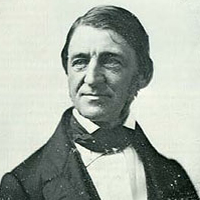Ode Inscribed to W.H. Channing by Ralph Waldo Emerson: Summary and Analysis
The poem Ode Inscribed to W.H. Channing by Ralph Waldo Emerson is a typical poem with all time significance. It is the poet’s answer to the question of whether the poet, thinker and (more generally) the other ‘professionals’ involve and affect politics and how. It was written before the American Civil War when the question of slavery had begun to divide the nation.

Ralph W. Emerson (1803-1882)
This poem is not directly related to Emerson’s idea of Transcendentalism; it is a statement of Emerson’s views regarding the contemporary issue of humanitarian reform, and the artist’s responsibility and role in the socio-political life of a nation. He was asked by colleague W. H. Channing to make a pronouncement on slavery. Emerson refused to take side in the political debate about whether to abolish slavery by dividing the United States into the North and the South or to unite the states and let slavery remain. This poem is in general an answer to the universal debate about whether a poet, artist or philosopher should take sides in political debates.
After some time, Emerson the poet and philosopher, decided to say something. This poem is addressed to the man (Channing) who had asked him to speak on the issue. In short Emerson again refused to take side, but he says that the problem lies with the very culture of America, the culture of things not human beings. He says that it would do no good either to “rend the Northland from the South” or to otherwise, until the Americans made fundamental changes at the very roots of their culture and behavior. Another historical personage mentioned in the poem is Daniel Webster, who was full of zeal for his ideas of materialistic improvement of life which would gradually solve problems from their very roots. Emerson bitterly criticizes that attitude. In one way, the ode is Emerson’s explanation of his reason for remaining aloof, and a proclamation of his strong feeling regarding the issues. But it does answer with a universally applicable philosophy how the problem of the American conflict could be solved.
The American people had forgotten the real values that life meaningful; their culture was that of "things". This applies to the entire modern world and its culture, but it had become striking in Emerson’s time in America. In their passion to aggrandize themselves, men had reduced humanity to a thing, and elevated thing to a place of eminence. The poet suggests a remedy: one should live for “friendship” for “love”, and for “truth’s and harmony’s behalf”. One must not be too zealous and get taken in by the priest’s can't (the long liturgical sermons of the priest that do not value human beings but the abstract beings and system); one should also be not stuck to the “statesmen’s rant” (which means the politicians’ loud and meaningless speeches).
Cite this Page!
Shrestha, Roma. "Ode Inscribed to W.H. Channing by Ralph Waldo Emerson: Summary and Analysis." BachelorandMaster, 16 Nov. 2013, bachelorandmaster.com/britishandamericanpoetry/ode-inscribed-to-channing.html.
Related Topics
The Snow Storm: Summary and Analysis
Ralph Waldo Emerson: Biography
 |
bachelorandmaster.com |